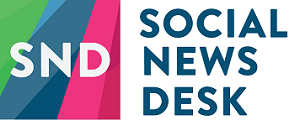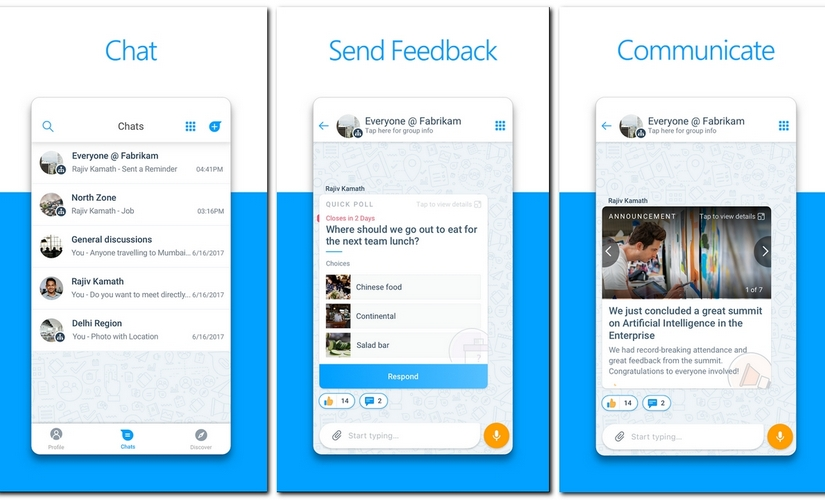The email has always been the go-to tool for workplace communication. However, a lot has changed over the past decade. As a whole new generation of millennials, brought up on a staple of instant messaging apps take up key decision-making roles in organizations, a technology shift was natural. Separate studies conducted by the Radicati Group indicates there are 3.5+ billion (according to 2018 data) email users across the world compared to over 6 billion (according to 2017 data) instant message users. If the gulf isn’t evident, then their growth patterns will make it clear- While the worldwide email user numbers are expected to reach 4.2 billion by the end of 2022, the IM user accounts show a 9% year-on-year growth reaching 8+ billion by 2021.
Why is instant messaging preferred over email at work?
- Higher Scope Of Collaboration: Instant messaging apps, in general, offer many upsides compared to emails. Chat apps provide a common platform for all team members to communicate and collaborate effectively. Group chats with features like screen sharing are instrumental in discussion and presentation. A single-channel to handle multiple conversations is much less time consuming than drafting and sending emails.
- Enhanced Productivity: According to a McKinsey report, an average professional spends as much as 6.5 hours/week sending and replying to emails. In the present day workspace, everyone is in a hurry to get work done. As such, it is challenging to communicate effectively via emails. Discussions can quickly rack up in an email thread and get lost in the clutter. Moreover, quick-fire decisions can get delayed by the time an email is sent and the responder reverts. IM on that front shortens the period in which discussions happen and therefore speed up the decision-making process. This frees up time spent in returning calls and (or) replying to emails.
- Supports Present Day Team Dynamics: Teamwork can be achieved when there is a continuous, uninhibited, flow of ideas between members. However, due to the different team dynamics comprising work from home employees, and mobile workforce, it is difficult to keep in touch over emails. This is where chat-based productivity apps shine; by connecting all team members and encouraging collaboration and brainstorming. It also provides the freedom, to be frank about new ideas, by blurring the gap between personal and professional conversation.
Commercial chat applications bleed into the workspace after gaining a stronghold over personal messaging, because they are free, easy to use, and a majority of the population is familiar with the usage. Chat apps are even more popular than social media networks. In fact, in a recent study conducted by Business Insider, the top chat apps have emerged victorious over top social networking websites when it comes to the user base. The messengers witness higher usage per day and retain more users compared to popular social networks.
Using IMs as a work communication channel might seem like a great idea at first, but some significant cons need to be addressed by any organization. Casual commercial chat applications are becoming increasingly commonplace at work, with employees sharing not only personal data but also confidential company data. This poses the risk of sensitive data being misused.
While the popular commercial chat apps advertise end-to-end encryption, it works fine for 1:1 chat, but large group chats essential to organization-wide communication aren’t secure. Moreover, there is no control, transparency, governance, or reassurance provided by these apps towards organizational security. Due to the non-compliance with international standards and security protocols like GDPR, casual chat apps have been banned for office use by reputed enterprises like Deutsche Bank and Continental Tyres.
Keeping track of official communication happening on commercial chat apps is nearly impossible, and that is where we step into the domain of shadow IT. Professionals using unsecure communication tools can pose severe threats to the organization viz. data leakage, hacking of confidential information leading to dire consequences. The only way to mitigate this problem is through the adoption of secure, licensed, made for work, chat-based productivity apps like Kaizala– It does everything a commercial messaging app can do, and more. Plus, it offers enterprise-level security and is compliant with GDPR, ISO 27001, SOC1, and HIPAA.
Kaizala also can handle large group conversations with the option to add unlimited members to a group. The work-related groups can be made private, and further security can be added by making an Azure directory sign in mandatory. There are a variety of built-in action cards like polls, surveys, assigning jobs, tracking attendance, and more, which make team collaboration more effective. Kaizala keeps the familiar user interface while introducing practical features and tighter security.
The commercial chat apps are taking over the workspace communication due to the lack of a more convenient alternative. Kaizala provides organizations the change to enhance productivity, tap into an introverted talent base, bypass hierarchical conversation, improve teamwork and collaboration without risking them to a potential data leak worth millions.

